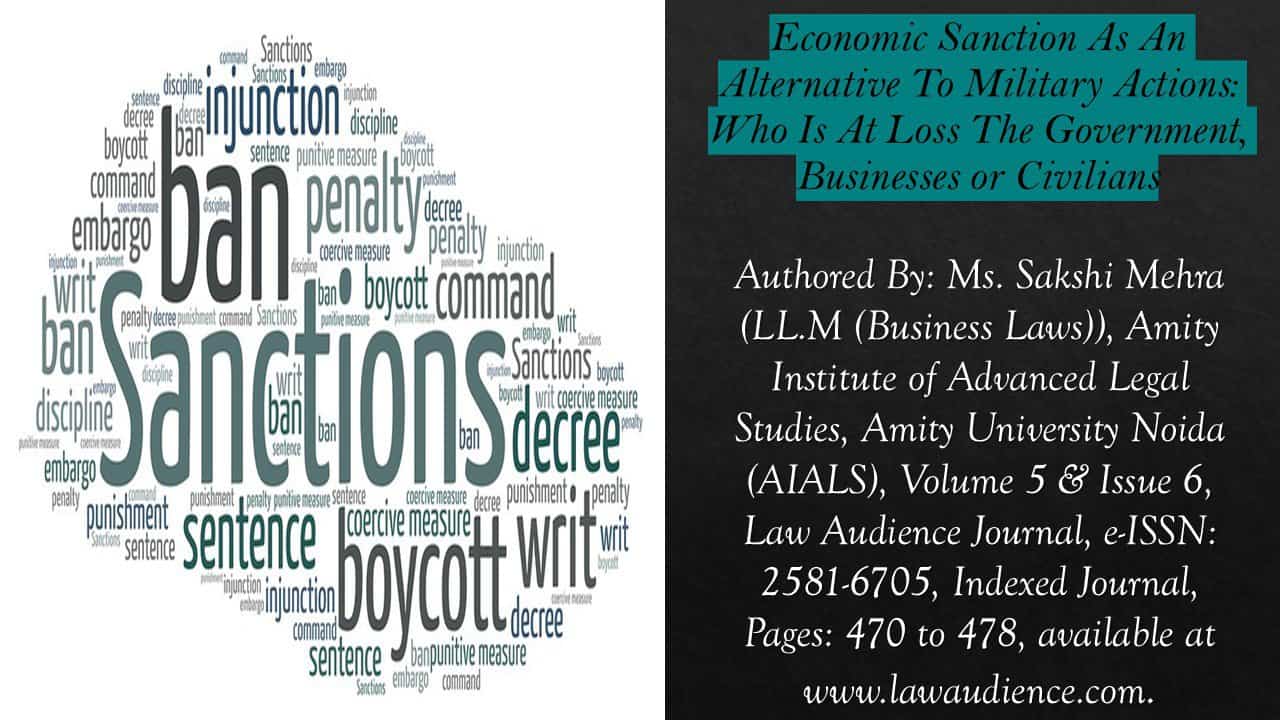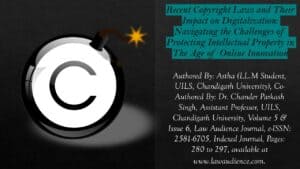Click here to download the full paper (PDF)
Authored By: Ms. Sakshi Mehra (LL.M (Business Laws)), Amity Institute of Advanced Legal Studies, Amity University Noida (AIALS),
Click here for Copyright Policy.
ABSTRACT:
“As a substitute for military action, economic sanctions have grown in popularity in contemporary geopolitics. The humanitarian and ethical consequences of these actions are severe and disproportionately impact people, even though they are frequently rationalized as a way to prevent aggression or enforce global standards. Although economic sanctions target governments and non-state actors, this research delves into how they inflict substantial collateral damage on ordinary citizens, particularly in nations that are already vulnerable. Using examples from the sanctions imposed on Iraq in the 1990s, Afghanistan after 2021, the trade war between the US and China, and the conflict between Russia and Ukraine, this paper shows how sanctions cause inflation, unemployment, food insecurity, healthcare collapse, loss of livelihood, and trade-related sanctions. While governments seek out new alliances, trade routes, or digital currencies to evade sanctions, ordinary citizens endure economic exclusion and hardship. Victims include small companies, farmers, and healthcare workers, who are already seeing their income disparity and social stability eroded. According to the study’s authors, sanctions do little to bring about regime change and more often cause global economic realignments that undermine Western supremacy. The impersonal character of blanket sanctions raises moral questions because they do not target vulnerable populations and do not comply with legal humanitarian exemptions. According to the research, sanctions should be accompanied by safeguards to protect civilians from any negative consequences and should be more targeted. To prevent geopolitical strategies from jeopardizing humanitarian values, there must be a transition to more ethically responsible sanction regimes. It is evident that today most countries are using Economic sanctions as the preferred tool for geopolitical conflict resolution. While, in some cases it is necessary for countries to impose such sanctions. However, in most of the cases it is just the Power politics and a game of Control and Politics and It is the common man that suffers the most as often the government ends up finding alternate trade routes. “Most Legal analyses focus on government policies and Corporate Interests, but sanctions affect ordinary people the most.”
This Article aims to discuss the Ethical and Humanitarian impact of Economic sanctions on Civilians.
I. ETHICAL AND HUMANITARIAN IMPACT OF ECONOMIC SANCTIONS ON CIVILIANS:
I.I IRAQ SANCTIONS (1990- LATE 1990’S):
When the economic sanctions were imposed on Iraq in the year 1990 when it had invaded Kuwait, it was aimed to deter aggression. However, they had several Humanitarian consequences for more than a Decade. It caused widespread suffering to common man and even legal exceptions such as humanitarian waivers were ineffective in mitigating their impact. The Economic sanctions imposed on Iraq by the UNSC in 1990 had banned all imports and exports to and from Iraq, froze Iraqi assets abroad and severely restricted Iraq’s ability to trade oil which is its primary source of revenue. The Humanitarian consequences as a result were severe and caused severe shortages leading to widespread malnutrition. The healthcare system has collapsed as a result of limited access to medicines and caused a rise in mortality, especially amongst children. According to UNICEF reports, by the late 1990’s Iraq had suffered economic devastation with surge in Inflation, Unemployment, poverty and child mortality because of the economic sanctions imposed.
I.II U.S SANCTIONS ON AFGHANISTAN (2021 TO PRESENT):
Afghanistan was taken over by Taliban in the year 2021. Prior to the year 2021, Afghanistan was heavily dependent on foreign aid which accounted for nearly 75% of its public spending. Post August 2021, measures such as Freezing Afghan assets, cutting off international aid and imposing financial restrictions were placed on Afghanistan under terrorism related sanctions. These measures were targeted at the Taliban which is a Non state actor in Afghanistan. Freezing sovereign reserves had crippled the entire Afghan Economy leading to mass unemployment, food shortage and collapse of the economy and harmed the Afghan civilian rather than the Taliban. As a result of these economic sanctions imposed on Afghanistan, by 2022, nearly 90% of Afghans had faced food insecurity with over 1 million children at risk of severe malnutrition. The fear of secondary sanctions led international banks to avoid transactions involving Afghanistan the inability to transfer funds and import medical supplies led to a breakdown of healthcare services forcing many hospitals to shut down. While the Sanctions were aimed to pressure the Taliban, they primarily hurt civilians worsening poverty and displacement. Precedents from Iraq Sanctions (1990) have already shown that broad financial restrictions can devastate a population without achieving political goals and yet such economic sanctions were imposed on the entire financial system rather than a targeted sanction on the Taliban.
I.III GLOBAL EXAMPLES OF CIVILIAN LIVELIHOOD LOSSES:
As previously discussed in Chapter 1, in the US-China trade War from 2018 to Present, the most affected area was Manufacturing and Tech. Many American Farmers lost billions as China had imposed retaliatory tariffs on US agricultural exports Chinese Tech worked also faced severe consequences after the USA had banned chip exports leading to complete layoff of Huawei and ZTE Similarly, During the India’s ban on Chinese products post Galwan Clash, the trade and digital sectors were the most affected. Many Indian App developers and Digital Marketing experts lost their jobs when government had banned more than 300 Chinese applications. Apart from Digital Economy, the next most affected sector was Electronics and machinery as small traders and manufacturers relying on Chinese imports faced price hikes and losses. The Russia Ukraine war is yet another example of how an isolated conflict between 2 countries had the power to disrupt the global supply chain with the most affected areas being Agriculture, Energy and Technology.
II. ECONOMIC IMPACT OF TRADE RELATED SACNTIONS ON CIVILIAN POPULATION: CASE STUDIES:
II.I INFLATION:
Economic sanctions leading to inflation can be seen in various countries like in Russia, where western sanctions on banks and oil export have caused high inflation as a result of ruble devaluation. U.S economic sanctions on Iraq also had a negative effect on its oil sector and caused high food prices and collapse of currency. The most suffered population was Middle Class families as they have struggled to afford basics like medicine and fuel.
II.II UNEMPLOYMENT:
Economic sanctions cost jobs of several people around the world. During the US- Chinese Trade war, several factory workers in china had to lose their jobs as a result of exuberant U.S tariffs on Chinese goods. Similar conditions have been seen in Ukraine’s war-ravaged economy post Russian invasion and Mass layoffs of major ventures in Russia like McDonald’s, Apple causing loss of employment to several people.
II.III SMALL BUSINESSES AND INDUSTRIES:
Small Businesses such as Agriculture, Pharmaceuticals, Healthcare and technology has suffered a major loss as a result of the Economic sanctions. Some Examples includes Loss of livelihood of billions of farmers across America post retaliatory tariff imposed by China, freezing of government funds by the US in Afghanistan causing a collapse in healthcare services, USA’s ban on technological exports from China post Trade war and Global energy and fuel crisis faced after Russia cut off gas supplies across Europe. These are a few examples amongst many that are often left unseen and not recorded in official records. The common point in all these conflicts and economic sanctions imposed are that the poorest civilians suffer the most as the supply chain breakdowns hit foods and other essential commodes like medical healthcare facilities etc. While the government corporations adjust, millions of civilians worldwide are the real victims who are faced with unemployment, poverty and displacement due to such conflicts. Governments often find alternative trade routes, allies or economic strategies that enable them to bypass restrictions, however the most affected out of these conflicts is the Civilian population. Economic Sanctions disrupt economies but rarely overthrow governments. In fact, it creates new economic allies and alternative currencies. “Sanctions are a double-edged sword—they create pressure but also force economic realignment, often strengthening non- Western trade networks rather than isolating the target.”
III. HOW DOES THE GOVERNMENT BYPASS ECONOMIC SANCTIONS:
As previously discussed, Economic Sanctions disrupt economies but rarely overthrow governments. The governments often end up finding alternative trade routes and bypasses economic sanctions by forming new allies Eg: Russia formed new allies with China, India and Middle East post 2022 Sanctions. Other Methods Include: Using Alternative Payment systems Like SPFS and CIPS to trade without using U.S Dollars, Use of Barter Trade and Crypto currency by North Korea and Iraq, Using Third party trade routes to continue businesses with sanctioned countries, eg: Hong Kong and Dubai, Focusing on Domestic development of Industries Like “Atmanirbhar Bharat” used by India.
IV. CONCLUSION:
In conclusion, Economic Sanctions are short term solutions that cause Political Pressure and Instability, and various examples have shown the same. While governments and corporations find ways around sanctions, the poorest and the middle class bear the real economic pain. A new tool in international relations, economic sanctions allow for the non-military imposition of pressure on states and non-state entities. But there are serious humanitarian and ethical issues with their wider effects, particularly on civilian populations. Case studies from the past and present show that sanctions do not always produce the desired political results; examples include the 1990s in Iraq, the years after 2021 in Afghanistan, and the current conflicts between Russia and Ukraine and the United States and China. On the contrary, they lead to disastrous outcomes for regular people, such as high inflation, food insecurity, job losses, and the disintegration of vital services like education and healthcare. The most vulnerable people bear the brunt of sanctions, while powerful governments and businesses find ways to adapt, such as by forming new trade partnerships, switching currencies, or finding legal ways around them. Economic isolation and worsening living conditions disproportionately affect people with middle- and lower-incomes. For example, in Afghanistan, sanctions meant to weaken the Taliban’s grip on power ended up freezing all of the country’s assets, causing millions to starve to death and lose hope in the government’s ability to reform. In addition, widespread sanctions almost never lead to a change in government or substantial political reform. On the contrary, they frequently result in more lasting shifts in economic power, with new alliances being formed and alternative financial systems being promoted, which in turn weaken the grip of established global powers. Economic sanctions must be rethought and reapplied immediately in view of these facts. Separating political leaders from civilian populations requires policymakers to think about more measured and targeted approaches. If we really care about ending human suffering, we need strong, clear, and strictly enforced humanitarian exemptions. In order to maintain international norms without diminishing human dignity, sanctions should not be used as a tool for collective punishment but rather based on fairness, proportionality, and humanitarian responsibility.
Cite this article as:
MS. SAKSHI MEHRA, “Economic Sanction As An Alternative To Military Actions: Who Is At Loss The Government, Businesses or Civilians” Vol.5 & Issue 6, Law Audience Journal (e-ISSN: 2581-6705), Pages 470 to 478 (6th May 2025), available at https://www.lawaudience.com/economic-sanction-as-an-alternative-to-military-actions-who-is-at-loss-the-government-businesses-or-civilians/.
Footnotes:
Forum, J. P.-. G. P. (n.d.). Sanctions against Iraq. https://archive.globalpolicy.org/security/sanction/indexone.htm
Ibid
1990 UNICEF annual Report. (n.d.). In https://www.unicef.org/media/93601/file/UNICEF-annual-report-1990.pdf. https://www.unicef.org/media/93601/file/UNICEF-annual-report-1990.pdf
Amin Stanikzai, “Impacts Of the Afghan Frozen Assets on the trade and Banking of Afghanistan”, EPH – International Journal of Humanities and Social Science, Volume 8 Issue, 02 April 2023
Ibid
Drake, D. (2019, May 24). How the Trade War with China Is Hurting U.S. Farmers – Wharton Global Youth Program. Wharton Global Youth Program. https://globalyouth.wharton.upenn.edu/articles/world- economy/how-the-trade-war-with-china-is-hurting-u-s-farmers/
7Natalie Fang Ling Cheng, Akram Shavkatovich Hasanov, Wai Ching Poon, Elie Bouri,”The US-China trade war and the volatility linkages between energy and agricultural commodities” Energy Economics, Volume 120, 2023, 106605, ISSN 0140-9883, https://doi.org/10.1016/j.eneco.2023.106605. (https://www.sciencedirect.com/science/article/pii/S0140988323001032)
The economic impact of the ban on TikTok in India. (2023). In International Journal of Novel Research and Development (Vol. 8, Issue 7) [Journal-article]. https://ijnrd.org/papers/IJNRD2307341.pdf
Ibid
1990 UNICEF annual Report. (n.d.). In https://www.unicef.org/media/93601/file/UNICEF-annual-report-1990.pdf. https://www.unicef.org/media/93601/file/UNICEF-annual-report-1990.pdf
Niftiyev, I. (2023). Third-country economic consequences of Western sanctions on Russia: a thematic analysis of expert opinions in Azerbaijan. SocioEconomic Challenges, 7(3), 113–140. https://doi.org/10.61093/sec.7(3).113-140.2023
International Trade Centre (2023). SME Competitiveness Outlook 2023: Small Businesses in Fragility: From Survival to Growth
Kumari, A. (2023, July 7). Northern Sea Route for oil trade and polar research. Defence Research and Studies. https://dras.in/northern-sea-route-for-oil-trade-and-polar-research/
Sinclair, S. (2021, September 14). Young Koreans turning to crypto as alternative for creating wealth. CoinDesk. https://www.coindesk.com/markets/2021/04/27/young-koreans-turning-to-crypto-as-alternative-for- creating-wealth
References
1. Sanctions Against Iraq, GLOBAL POL’Y F., https://archive.globalpolicy.org/security/sanction/indexone.htm (last visited May 5, 2025).
2. Id.
3. UNICEF Annual Report 1990, UNITED NATIONS INT’L CHILD. EMERGENCY FUND, https://www.unicef.org/media/93601/file/UNICEF-annual-report-1990.pdf (last visited May 5, 2025).
4. Amin Stanikzai, Impacts of the Afghan Frozen Assets on the Trade and Banking of Afghanistan, 8 EPH INT’L J. HUM. & SOC. SCI. (Apr. 2023).
5. Id.
6. Diana Drake, How the Trade War with China Is Hurting U.S. Farmers, WHARTON GLOBAL YOUTH PROGRAM (May 24, 2019), https://globalyouth.wharton.upenn.edu/articles/world-economy/how-the-trade-war-with-china-is-hurting-u-s-farmers/.
7. Natalie Fang Ling Cheng et al., The U.S.-China Trade War and the Volatility Linkages Between Energy and Agricultural Commodities, 120 ENERGY ECON. 106605 (2023), https://doi.org/10.1016/j.eneco.2023.106605.
8. The Economic Impact of the Ban on TikTok in India, 8 INT’L J. NOVEL RES. & DEV. (2023), https://ijnrd.org/papers/IJNRD2307341.pdf.
9. Id.
10. UNICEF Annual Report 1990, UNITED NATIONS INT’L CHILD. EMERGENCY FUND, https://www.unicef.org/media/93601/file/UNICEF-annual-report-1990.pdf (last visited May 5, 2025). (Repeated due to citation format)
11. Ilkin Niftiyev, Third-Country Economic Consequences of Western Sanctions on Russia: A Thematic Analysis of Expert Opinions in Azerbaijan, 7 SOCIOECON. CHALLENGES 113 (2023), https://doi.org/10.61093/sec.7(3).113-140.2023.
12. INT’L TRADE CTR., SME Competitiveness Outlook 2023: Small Businesses in Fragility: From Survival to Growth (2023).
13. Anjali Kumari, Northern Sea Route for Oil Trade and Polar Research, DEF. RES. & STUD. (July 7, 2023), https://dras.in/northern-sea-route-for-oil-trade-and-polar-research/.
14. Sandali Handagama, Young Koreans Turning to Crypto as Alternative for Creating Wealth, COINDESK (Sept. 14, 2021), https://www.coindesk.com/markets/2021/04/27/young-koreans-turning-to-crypto-as-alternative-for-creating-wealth/.



